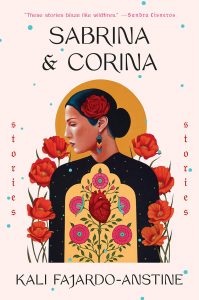Disclosure: I am an affiliate of Bookshop.org. I will earn a small commission if you click through the book link and make a purchase.
I am in love with Sabrina & Corina (One World, 2019), the debut short story collection by Kali Fajardo-Anstine. In this collection of loosely linked stories, Fajardo-Anstine gives voice to generations of Chicana and indigenous women living in Denver, Colorado, and in the fictional town of Saguarita.

In a 2019 interview with Westword, Fajardo-Anstine agrees that her work is feminist “if you believe that women’s voices need to be heard and not relegated to a marginalized alley of literature.” In her stories, we meet grandmothers, mothers, sisters, cousins, would-be mothers, widows. What destiny awaits women whose mothers have gone, whose lovers have abused them, in communities struggling with poverty, drug abuse, gentrification?
In the title story, Corina agrees to do the makeup for her deceased cousin Sabrina. Corina and Sabrina were close when they were young and drifted apart as they got older. Beautiful Sabrina lived a wild, messy life and died young. To the funeral attendees, it seems that Sabrina fulfilled a destiny. This beautiful funeral is “what she would have wanted” (44). She is now one more dead woman in a family that has already lost so many, “another face in a line of tragedies that stretched back generations” (44).
But no, Corina bucks that sentiment. Sabrina didn’t dream of her funeral. She says, “Sabrina didn’t want any of this. She wanted to be valuable.” In life, Sabrina knew she was seen as “nothing.” Like so many women in this collection, she hungered for more, but couldn’t make it there. In Sabrina’s case, she was strangled by a man. In the case of Doty, she was blinded by a man (“Sisters”). Liz was beaten by her lover (“Cheesman Park”). It’s hard to find a way forward, but their lives are no less important for not having found a way through.
To create art is to say that your voice and vision matters. It’s a statement that says, I am going to make something unified where only pieces existed before. Sometimes when I envision the artist, I imagine a gatherer, an old woman piling sticks together in a bundle, carting her objects away and using them to build a house — a nearly everlasting structure, for all things eventually disappear. But what art can do is deliver news to the world from the perspective of a single creator.
Kali Fajardo-Anstine, interview with Westword
These may seem like plainspoken stories, but beneath them is a tremendous cry to be heard. These lives are rich, beautiful, interwoven, caught in cycles of trauma, and even so, yearning to love and be loved. In her effortless, poignant style, Fajardo-Anstine makes art out of bags of sugar (“Sugar Babies”), graffiti (“All Her Names”), and yes, even lice (“Remedies”). We slip back and forth through time, reaching as far back as the heydey of drive-in movie theaters and forward through the gentrification spurred by the Green Gold Rush. Again and again, we hear the stories of women that suffered what the world demanded of them. These women would have been forgotten if not for Fajardo-Anstine’s insistence that their stories matter.
Like the human bones that are uncovered beneath the town in “Sugar Babies,” the dead must be resurfaced. Like the neighborhoods being gentrified in Denver, the history of places cannot be forgotten. Sabrina & Corina demands that the reader remember. Do not let silence be all that remains of the women who have struggled.
Although this collection did not offer commonplace happy endings–those sparkly, trauma-erasing things that so many Latina women can’t find–it gave me hope. It made me hope that the stories I haven’t heard–those of my grandmother, and her great-grandmother, and my aunts who have passed, and my own mother’s un-shared childhood–are still out there. I imagine a cassette tape of their words, now paused. Thanks to a writer like Fajardo-Anstine, we can hit “play” again.
Special thanks to my book club, which selected this book for our November 2020 reading.